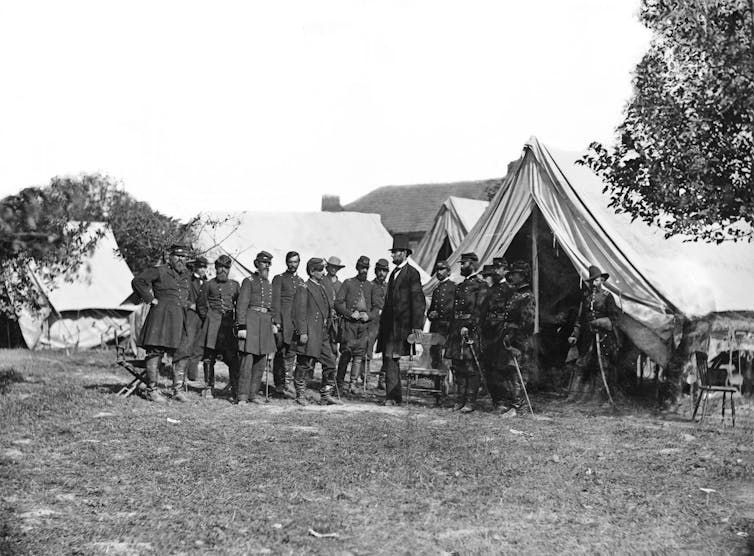Adrian Brettle, Arizona State University
In March 1861, as Abraham Lincoln was inaugurated as president, the United States faced its greatest crisis: its sudden and unexpected dissolution. Seven of the then 31 states had already voted to secede from the Union.
What he did in the following months and years made such a massive difference in history that David M. Potter, an eminent historian of the South, concluded years ago that if Lincoln and the Confederate president Jefferson Davis had somehow swapped jobs, the Confederacy would have secured its independence. The Union’s military victory in the Civil War was not inevitable; another, lesser leader may well have accepted a compromise with the South. As I discuss in my book “Colossal Ambitions: Confederate Planning for a Post–Civil War World,” Confederates attempted throughout the conflict to negotiate a peaceful coexistence between an independent slaveholders’ republic and the United States.
In withstanding this effort and persevering against a determined military enemy, Lincoln left three noteworthy lessons about leadership: When fighting a lethal foe on home soil, he expertly managed top politicians; related well with the people; and dealt clearly with the military as commander-in-chief.
Handling political allies – and foes
Lincoln built and led a Cabinet of great strength by accommodating dissent. He included the two men who had been his rivals for the Republican Party’s presidential nomination in 1860, William H. Seward and Edward Bates. He sought advice on military matters, with daily briefings from his commanding general, Winfield Scott. He also asked for input on political issues – including those as important as the drafting and publication of the Emancipation Proclamation.
While he welcomed differences of opinion, he did not shirk responsibility. On April 1, 1861, Seward proposed declaring war on various European powers as an attempt to reunite the country. Part of the idea involved putting Seward in charge of the war, effectively elevating the president to be a ceremonial figurehead above the fray.
The president’s reply was stark: If there was going to be a war, he would lead it: “I remark that if this must be done, I must do it.”
Lincoln also dealt deftly with conflicts presented by self-important colleagues. When Treasury Secretary Salmon P. Chase, plotted to contest Lincoln’s nomination for reelection in 1864, the president elegantly nominated his rival to be chief justice of the United States, removing him from political contests.

Ron Cogswell/Wikimedia Commons, CC BY
Connecting with the people
Lincoln was equally deft at relating to the public, having developed a carefully crafted ordinariness over his 30-year career of political campaigning in Illinois. That included cultivating a reputation for accessibility. As movie viewers saw in Steven Spielberg’s 2012 film “Lincoln,” his White House was open to all visitors and petitioners. On the president’s daily rides to and from his favorite summer retreat in Washington, the cottage in Rock Creek, he passed soldiers’ hospitals and contraband camps, where African American refugees from the South gathered. Poet and wartime nurse Walt Whitman witnessed Lincoln’s “eyes, always to me with a deep latent sadness in the expression,” projecting his awareness of the gravity of the crisis, and his honesty and humility.
In Lincoln’s reassurance of the people, he communicated a wider message about the purpose of the war: In a mid-19th-century world dominated by aristocracies and monarchies, only in the United States was it possible for a man of such a humble background to rise to be head of state. In his view, the insurrection of slaveholders jeopardized the survival of that experiment in democracy and social mobility.
Therefore, in his great speeches, he used familiar words and phrases from Shakespeare and the Bible to present fighting the war both as a sacred mission, to achieve God’s aims, and as a universal, ideological imperative: to save republican self-government for the world. Emancipation would further this aim: in the closing of the Gettysburg Address, Lincoln hoped “that this nation, under God, shall have a new birth of freedom – and that government of the people, by the people, for the people, shall not perish from the earth.”

Alexander Gardner/Wikimedia Commons
Managing the military
Lincoln’s ultimate success as a leader during the Civil War depended on his relationship with the Army, especially with its commanders.



Lincoln was a leader absolutely to be emulated.
The feature that most impressed me, reading several stories from his life, is his ability to use storytelling to touch the heart.
Lincoln seeks a balance between his desire to demolish slavery, his role in managing American politics and the attempt to end a bloody civil war.
There are crucial moments when opponents or opposing factions disagree with each other on a range of topics. Rather than simply stating his position, Leader Lincoln uses narrative. He used a vast and varied series of anecdotes or examples.
The use of stories as an influence technique, within any group or organization, is a determining factor. It offers the opportunity for the listener to connect and relate personally to the information. Furthermore, the point of view is transferred to one’s interlocutor in a way that is not conflictual, but ironic and personalized.
Usually, when we try to influence others by getting in tune with the topic we are proposing, the risk is to become and use too serious tones. President Lincoln had understood that such an attitude would not bring about any positive change in a conflict and tremendously serious environment. His stories always came with a definitive ending, linking the decision to a very similar situation that had already occurred. Not to mention the fact that raising your peers’ laughter strengthens their consensus. It is very difficult to be effective if you lose the favor of your follower network.
Very cool stuff, indeed.
Thank you, The Conversation
Finding the sweet spot between conflict and agreement is a fabulous leadership practice. Without conflict, there is no progress – learning + movement. Without agreement there’s heat without light. A leader who can embrace vulnerability by balancing both demonstrates courage and trust, and the people around her or him will reciprocate, never mistaking fealty for loyalty. BTW, fealty is the near enemy of loyalty, as pity is the near enemy of empathy.
Here’s a link to a piece about that (which I got from Louis Penny’s wonderful novel, The Cruelist Month, which is, of course, April):
http://azalearning.com/aza-learning/near-enemies/
Let fun have you.
Mac